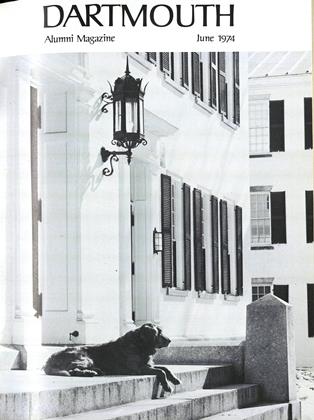A significant segment of the Dartmouth faculty has been calling in recent weeks for a more weighty voice in the affairs of the College. Their dissatisfaction at what they see as their dwindling role in institutional decision-making found focus in a 1,500-word essay, "On the Need for a Stronger faculty at Dartmouth College," distributed early in April to the entire instructional staff by Biology Professor Thomas B. Roos and Stephen G. Nichols Jr. '58, Professor of Romance Languages and Literatures. The document charged that college authorities have accepted a ethology of managerial expertise that has encouraged the growth of hierarchical chains of command and vertical reporting structures."
At an informal caucus, attended by some 80 faculty members, and a special faculty meeting called by President Kemeny as a result, a number of grievances were aired, although proposals for unionization - a system adopted in recent years in a number of institutions of higher education, primarily large state university systems - generated only minimal support.
On the economic front, the faculty is asking for better compensation for all college employees, salary increases at least equal to the rise in cost of living, rather than the five percent maximum proposed in the austerity budget. President Kemeny has reported that the Trustees at their April meeting directed that any additional savings beyond already budgeted cuts, were to go to faculty and staff raises.
The faculty has also called for a halt in what they call undue proliferation of the administration, faculty representation on the Board of Trustees, and a standing - rather than an ad hoc - Committee on the Economic Status of the Faculty, to report directly to the faculty at large.
President Kemeny contends that it would be a "major mistake" to have specific constituencies represented on a Board of Trustees as small as Dartmouth's. He and other college spokesmen have countered the charge of undue growth in the number of administrative personnel - about one third, or from 201 to a projected 267 between the 1968-69 academic year and 1974-75 - as being attributable largely to the increased complexity of the organization and the necessity of staffing improved student services, such new programs as year-round operation, coeducation, and equal opportunity, government-directed affirmative action efforts, and the expanding programs in existing areas such as Tuck, Thayer, and the Medical School, the libraries, and business administration. Some temporary positions - for example, those in the Dartmouth Plan Office, established to implement year-round operation - are being phased out, administrative officers point out.
Mr. Kemeny also noted that, while the number of officers employed to administer the affairs of the College and the three associated schools has grown from an overburdened 42 in 1940-41 to 201 in 1968-69 to the 267 projected for next year, the faculty for the undergraduate College has grown at equivalent stages from 196 to 248 to 300.
 View Full Issue
View Full Issue
More From This Issue
-
 Feature
FeatureEducation in the Round
June 1974 By ANDREW J. NEWMAN AND MELANIE FISHER -
 Feature
FeatureChina's Barefoot Doctors
June 1974 By PETER KONG-MING NEW AND MARY LOUIE NEW -
 Feature
FeatureCASTLES ON THE CONNECTICUT
June 1974 By JAMES L. FARLEY -
 Feature
FeatureO Pioneers
June 1974 -
 Feature
FeatureRetiring Professors
June 1974 -
 Article
ArticleRetirement: Plan It and Enjoy
June 1974 By RICHARD S. BURKE '29







